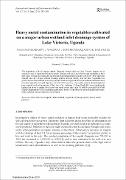Heavy metal contamination in vegetables cultivated on a major urban wetland inlet drainage system of Lake Victoria, Uganda

View/
Date
2010-06Author
Jolocam, Mbabazi
J., Wasswa
J., Kwetegyeka
G.K., Bakyaita
Metadata
Show full item recordAbstract
The population of the Ugandan capital, Kampala, located close to Lake Victoria, appears to be
exposed to risk of ingesting the heavy metals Cadmium (Cd) and Lead (Pb) through vegetables in their
diet. Lake Victoria is responsible for frequent torrential polluted runoffs in the city. The Nakivubo
channel, the city’s major wetland drainage system, empties directly into the lake. Vegetables are
grown on the urban wetland soils. Heavy metal content in vegetables from the wetland cultivation sites
was determined by wet acid digestion, with 87–92% recovery. The results showed that although the
heavy metal levels of manganese (Mn), zinc (Zn), cadmium (Cd) and lead (Pb) were significantly
higher than those in similar food crops from rural control sites, only Cd and Pb exceeded the World
Health Organisation (WHO) maximum permissible levels. Cd and Pb pose serious human health risks.
Early pollution control measures are advisable.
